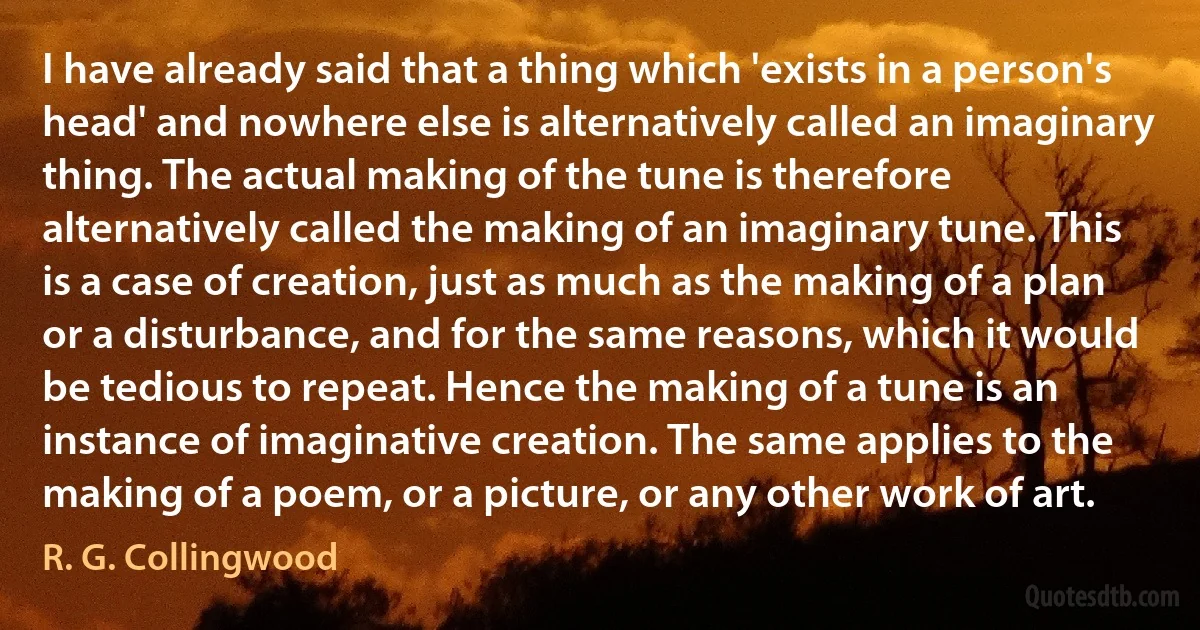R. G. Collingwood quotes
The word art has in ordinary usage three senses. First, it means the creation of objects or the pursuit of activities called works of art, by people called artists; these works being distinguished from other objects and acts not merely as human products, but as products intended to be beautiful. Secondly, it means the creation of objects or the pursuit of activities called artificial as opposed to natural; that is to say objects created or activities pursued by human beings consciously free to control their natural impulses and to organize their life in a plan. Thirdly, it means that frame of mind which we call artistic, the frame of mind in which we are aware of beauty.

R. G. Collingwood
The real is the present, conceived not as a mathematical point between the present and the past, but as the union of present and past in a duration or permanence that is at the same time change. Thus the past as past and the future as future do not exist at all, but are purely ideal; the past as living in the present and the future as germinating in the present are wholly real and indeed are just the present itself. It is because of the presence of these two elements in the present... that the present is a concrete and changing reality and not an empty mathematical point.

R. G. Collingwood
For I do not think of aesthetic theory as an attempt to investigate and expound eternal verities concerning the nature of an eternal object called Art, but as an attempt to reach, by thinking, the solution of certain problems arising out of the situation in which artists find themselves here and now. Everything written in this book has been written in the belief that is has a practical bearing, direct or indirect, upon the condition of art in England in 1937, and in the hope that artists primarily, and secondarily persons whose interest in art is lively and sympathetic, will find something of use to them.

R. G. Collingwood
If it is asked why Socrates permits certain forms of art to be retained in the ideal state instead of consistently banishing all alike, the answer is surely obvious: these are, in the opinion of Socrates, the forms which art will take in the hands of men who understand its true nature.

R. G. Collingwood
We can now return to the distinction between language and symbolism. A symbol is language and yet not language. A mathematical or logical or any other kind of symbol is invented to serve a purpose purely scientific; it is supposed to have no emotional expressiveness whatever. But when once a particular symbolism has been taken into use and mastered, it reacquires the emotional expressiveness of language proper. Every mathematician knows this. At the same time, the emotions which mathematicians find expressed in their symbols are not emotions in general, they are the peculiar emotions belonging to mathematical thinking.

R. G. Collingwood
Language in its original imaginative form maybe said to have expressiveness, but no meaning. About such language we cannot distinguish between what the speaker says and what he means... Language in its intellectualized form has both expressiveness and meaning. As language, it expressed a certain emotion. As symbolism, it refers beyond that emotion to the thought whose emotional charge it is... The progressive intellectualization of language, its progressive conversion by the work of grammar and logic into a scientific symbolism, thus represents not a progressive drying-up of emotion, but its progressive articulation and specialization. We are not getting away from an emotional atmosphere into a dry, rational atmosphere; we are acquiring new emotions and new means of expressing them.

R. G. Collingwood


